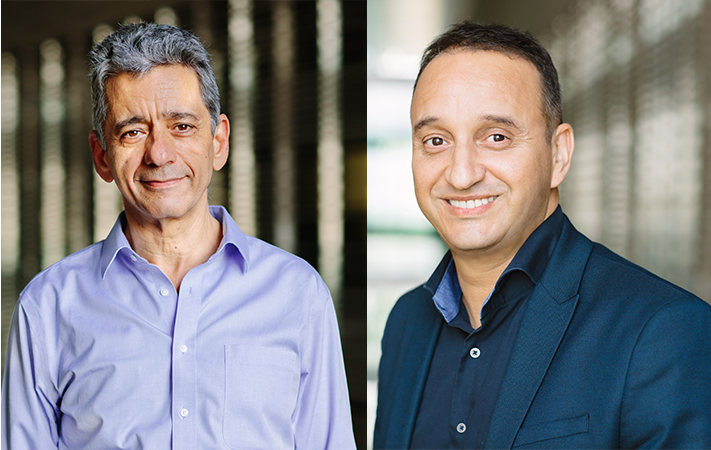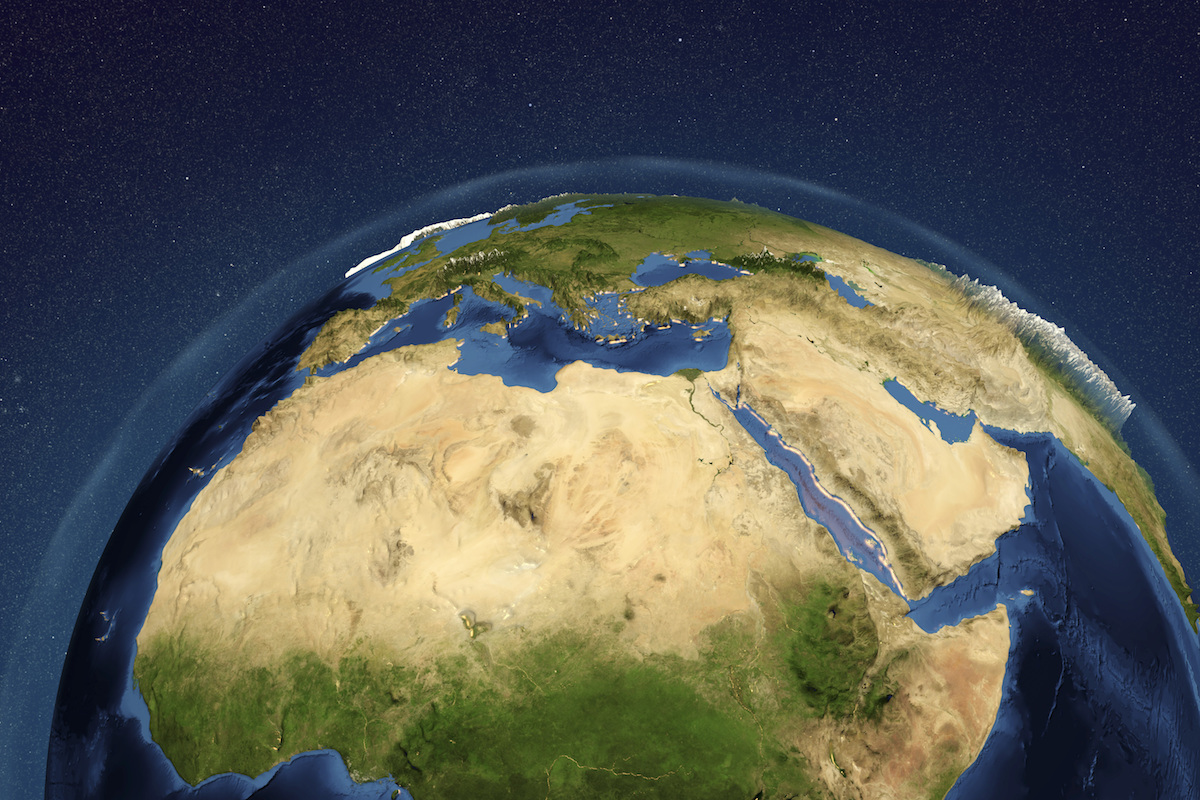KAUST professors receive Abdul Hameed Shoman Award for Arab Researchers

KAUST Professors Mohamed Eddaoudi (right) and Omar Knio (left) were recently honored with the Abdul Hameed Shoman Award for Arab Researchers. File photos.
-By KAUST News
Mohamed Eddaoudi, KAUST distinguished professor of chemical science and director of the University's Advanced Membrane & Porous Materials Center, recently received the Abdul Hameed Shoman Award for Arab Researchers for Renewable Energy, an award presented annually by the Abdul Hameed Shoman Foundation.
Omar Knio, KAUST professor of applied mathematics and computational science, was also honored by the Abdul Hameed Shoman Foundation this year as a joint recipient of the Shoman Award for Mathematical Modeling with Dr. Shaher Mohammed Ahmad Momani.
Key research areas
Eddaoudi's research focuses primarily on developing new strategies for the design and synthesis of functional solid-state materials from molecular building blocks and advancing the understanding of the structure-property relationship of materials.
His team at KAUST works towards developing made-to-order metal-organic frameworks (MOFs) to tackle challenging issues such as clean energy alternatives; advancing MOFs to store adequate hydrogen at room temperature and moderate pressures; reducing greenhouse gas emissions; and advancing the field of MOFs in the direction of creating efficient, low-cost MOFs that can capture large amounts of carbon dioxide.
Knio focuses on the development of mathematical methods, algorithms and software for the simulation of complex thermo-fluid systems; the quantification of uncertainty in model predictions; Bayesian model calibration; optimization under uncertainty; and the application of advanced computational methods to atmospheric and oceanic flows, combustion and energetic materials.
Recognizing outstanding science
The Shoman Foundation launched the Arab Researchers Award in 1982 to recognize outstanding scientific output leading to increased scientific and applied knowledge and awareness of the importance of scientific research. The award honors scientific research that contributes to solving vital problems locally, regionally and globally while also encouraging a culture of scientific research.
The Shoman Award is the first Arab award for scientific research, and it aims to celebrate, support and highlight the achievements of Arab researchers throughout the Arab world. It also aims to contribute to qualifying and inspiring future generations of Arab researchers, experts and specialists in different scientific fields.
The award covers the following six disciplines: medical and health sciences; engineering sciences; basic sciences; humanities, social and educational sciences; technological and agricultural sciences; and economic and administrative sciences.

The Abdul Hameed Shoman Award for Arab Researchers, which was launched in 1982, celebrates and highlights the achievements of scientific researchers throughout the Arab world. Image courtesy of Shutterstock.
2019's outstanding candidates
In September, the Abdul Hameed Shoman Foundation announced the winners of the 2019 Abdul Hameed Shoman Award for Arab Researchers in the prize's 37th cycle. Winners were selected after reviewing the reports of 12 specialized committees—including an elite group of Arab researchers—who acted as a jury for submissions.
Award recipients are given a certificate, a financial reward of $20,000 and a shield with the foundation's name and logo.
This year's award received submissions from 382 candidates from Jordan and the Arab world, with 23 applications disqualified due to non-compliance with the basic conditions of the award. Fifteen researchers submitted for the award's six fields. Each field is divided into two alternating topics that are selected by the award's scientific committee.
The scientific committee, which was chaired by HE Dr. Amin Mahmoud, announced that this year's award went to researchers of the following nationalities: Egypt (five awardees), Palestine (three awardees), Lebanon (two awardees), and one researcher each from Jordan, Tunisia, Oman, Iraq and Morocco.
A history of world-class science
Mahmoud noted that 434 men and women from various universities, institutions and scientific centers throughout the Arab world have been honored with the award since its establishment in 1982. He stressed the importance of encouraging researchers to carry out work that is of interest to all segments of society. He also stated that there is a need to develop strategies that contribute to solving the problems facing humanity and communities.
Valentina Qussisiya, CEO of the Abdul Hameed Shoman Foundation, stressed the urgent need to support scientific research aimed at overcoming barriers to societal development and the importance of scientific research directly related to challenges in the Arab world. These issues include the localization of technology; food shortage; shrinking arable land; and other problems that hinder development.
Related stories:
- Distinguished Professor Marc Genton receives statistics award
- KAUST Professor Peter Richtárik wins Distinguished Speaker Award
- KAUST Assistant Professor Raphaël Huser receives American Statistical Association award
-
KAUST Professor Kazuhiro Ohkawa elected Fellow of the Japan Society of Applied Physics

